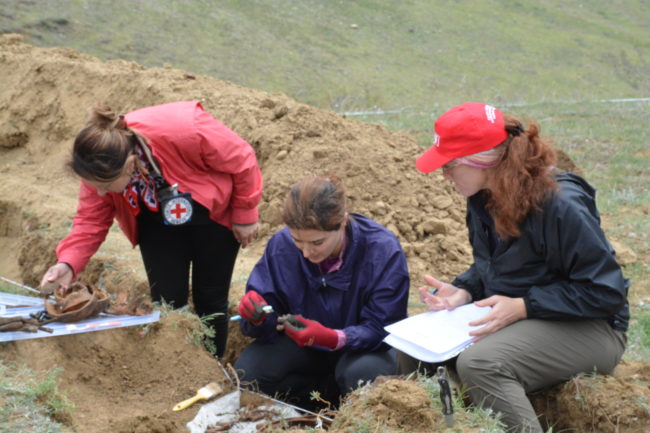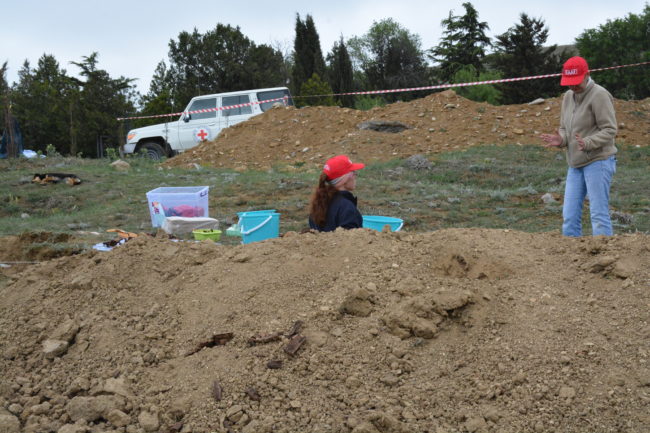

 There are over 2,000 people whose fate is still unaccounted for from Georgia’s conflicts in South Ossetia and Abkhazia, making it difficult for families to grieve and move on. While cross border efforts lead by the Red Cross are in full swing to find, exhume, and identify the bodies of the fallen — time is not on their side.
There are over 2,000 people whose fate is still unaccounted for from Georgia’s conflicts in South Ossetia and Abkhazia, making it difficult for families to grieve and move on. While cross border efforts lead by the Red Cross are in full swing to find, exhume, and identify the bodies of the fallen — time is not on their side.
‘If he is dead, then where is his body?’
For nine years Ana Samadalashvili from Gori has been waiting for her husband to return home. On 8 August 2008, Zaza Birtvelishvili entered Tskhinvali in a tank. He spoke with Ana by phone not long before. There his tracks disappear.
Photos later emerged of a destroyed Georgian army tank in the centre of Tskhinvali. Russian and South Ossetian media reported that Russian Army Colonel and then Secretary of the Security Council Anatoly Barankevich had personally destroyed it. No one could tell for sure if this tank was tank number 406.
Zaza was in the tank number 406, with the other members of his crew. It was impossible to read the markings on the tank burning in the centre of Tskhinvali, but Birtvelishvili went missing along with the rest of the crew.
Ana was searching for several people during war: her husband, brother, brother-in-law, cousin, they all took part in the war. They all came back except for her husband.
She is still looking for Zaza. She has appealed to the government and to the Red Cross. After the war was over, Zaza’s parents would go to the Incident Prevention and Response Mechanism meetings in Ergneti, in which the conflict parties discussed issues of concern, trying to get more information from the people involved, but to no avail. They also provided DNA samples to help to identify their son’s remains, but again, with no results.
Two years later, the government declared Zaza Birtvelashvili dead, setting aside a grave at the Mukhatgverdi Brothers Cemetery, near Tbilisi. Ana visits the grave with her children on 8 August every year.
‘Everyone is crying there, but we usually stand in silence’, she says.
‘We don’t know what we should do; mourn? What if he is alive, how can we mourn for a person who is alive? If he is dead, then where is his body? This grave is empty. We went through the worst eight years. It is impossible to forget all this. They say that time cures everything, but it’s not true. Unfortunately, time cannot cure everything’, Ana told OC Media.
Counting the missing
According to the Tbilisi-based Human Rights Centre, 1,800 Georgians and 135 Abkhazians are still missing as result of the Georgia–Abkhazia conflict; some are civilians. There are also 140 people missing from the Georgia–South Ossetia conflicts in 1989–1992, and about 50 from the 2008 war.
The International Committee of the Red Cross defines a missing person as someone who went missing during conflict and whose family does not have information about their fate from reliable sources.
‘Each party to the conflict must take all feasible measures to account for persons reported missing as a result of armed conflict and must provide their family members with any information it has on their fate’, the Red Cross states.
A cross border effort

In 2010, The Red cross set up a mechanism to collect information about missing persons, working with Georgia, South Ossetia, and Russia to do so. The only goal of this mechanism is to find information about the fate and location of the people who are missing.
Maia Kardava, spokesperson for the Red Cross in Georgia, says that all parties are exchanging information about possible locations of burial sites during their regular meetings.
‘The main goal is to inform the families of missing people what has happened to their loved ones’, she says, adding that according to international law, the families of missing persons are also considered victims of war.
The Red Cross began in early May to exhume two mass graves near Gori and one in Kaspi Gori to find the bodies of people who went missing in the conflicts of the 1990s and in 2008.
They plan to exhume more than 30 possible burial sites in 2017, in Shida Kartli, Imereti, Abkhazia, and near Tbilisi. They expect to find around 150 bodies.
Farrukh Islomov, who chairs Red Cross in South Ossetia, informed the public there about the exhumations near Gori and Kaspi during a press-conference on 2 June in Tskhinvali, at the offices of Sputnik Ossetia. He said that there are 177 people on a common list of missing persons from the conflicts of 1990s and in 2008.
After the August 2008 war, the previous government reported the discovery of a mass grave containing Georgian military servicemen near Tamarasheni, which is in South Ossetia. They reported that it was not possible to exhume the site due to the political situation.
However, Kardava assured OC Media that the mechanism is free of political influences, and that all parties have been cooperating fruitfully to solve this humanitarian issue, adding that the Red Cross doesn’t discriminate based on the ethnicity of the missing. The only thing that’s important is that families get the bodies, she says.
South Ossetia is ‘actively involved’
David Sanakoyev, who chairs the Ossetian delegation at the Incident Prevention and Response Mechanism meetings, told OC Media that South Ossetia is actively involved in the Red Cross coordination mechanism, and that it has been very productive. He said that exhuming burial sites gives hope to families that they will finally find the remains of their loved ones.
Sanakoyev says that since August 2008, South Ossetia has been looking for the eight missing people. Speaking of the burial sites in Tamarasheni that previous government spoke of, Sanakoyev said only that the next stage of the searches for the missing will proceed in South Ossetia.
A slow process
Kardava says that over the past six years, the red cross has discovered the bodies of 249 people. So far 107 have been identified, with the remaining 142 still in the process.
‘The process of identification is too long; it needs a lot of time because it happens in several stages. There is anthropological analysis, inspection of DNA samples to determine the identity of the person with high accuracy, and then handing the body over to the family. It is important for these families to honorably bury their loved ones’, she says.
According to the Red Cross, time is the worst enemy in this process, because it sweeps away many traces of the dead.
All place names and terminology used in this article are the words of the author alone, and may not necessarily reflect the views of OC Media’s editorial board.






